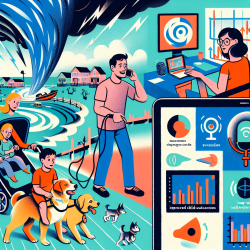In the rapidly evolving field of online therapy, staying updated with the latest research is crucial for practitioners. One significant study that offers valuable insights is "Design and Delivery Features That May Improve the Use of Internet-Based Cognitive Behavioral Therapy for Children and Adolescents With Anxiety: A Realist Literature Synthesis With a Persuasive Systems Design Perspective" by Eysenbach et al. This study explores the design and delivery features that can enhance the effectiveness of internet-based cognitive behavioral therapy (iCBT) for young clients with anxiety.
Here are key takeaways from the study that can help you improve your online therapy sessions:
1. Tailoring and Personalization
According to the study, tailoring and personalization are critical for increasing user engagement. By customizing the content based on the user's age, specific anxiety concerns, or even their name, you can make the therapy sessions feel more relevant and personalized. This approach not only increases engagement but also improves the overall effectiveness of the therapy.
2. Reminders
Reminders are another powerful tool. The study found that sending automated, personalized reminders through email or the therapy platform can significantly boost program completion rates. These reminders help keep the therapy process on track and ensure that the users are continually engaged.
3. Rewards
Incorporating a reward system can also enhance user engagement. Whether it's a virtual diploma upon completing a module or points that can be redeemed for prizes, rewards provide positive reinforcement and encourage users to stick with the program.
4. Therapist and Parent Support
The study highlights the importance of adjunct support from therapists and parents. Regular, web-based communication with a therapist can provide technical support, answer questions, and offer encouragement. Parental involvement can further reinforce the therapy content and help manage the child's progress, making the therapy more effective.
5. Social Role and Credibility
Lastly, incorporating a social role, such as a virtual therapist or cartoon guide, can make the therapy more interactive and engaging. Additionally, ensuring that the program is trustworthy, authoritative, and credible can improve the perceived value of the therapy, leading to higher completion rates.
By integrating these strategies into your online therapy sessions, you can enhance user engagement and improve outcomes for children and adolescents with anxiety.
To read the original research paper, please follow this link: Design and Delivery Features That May Improve the Use of Internet-Based Cognitive Behavioral Therapy for Children and Adolescents With Anxiety: A Realist Literature Synthesis With a Persuasive Systems Design Perspective










